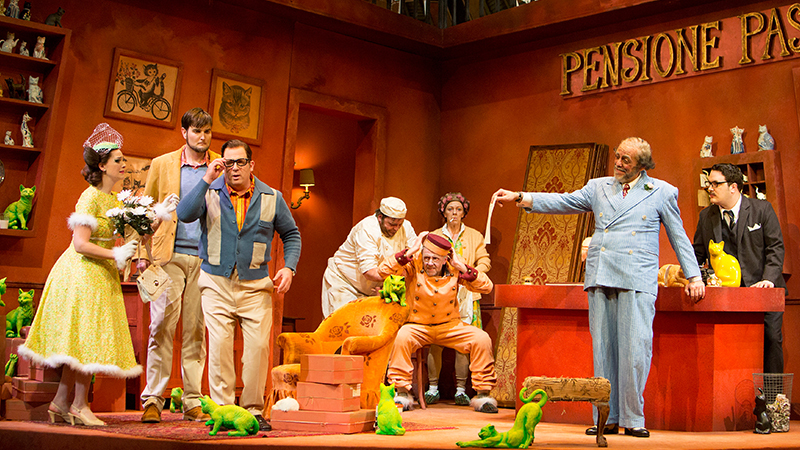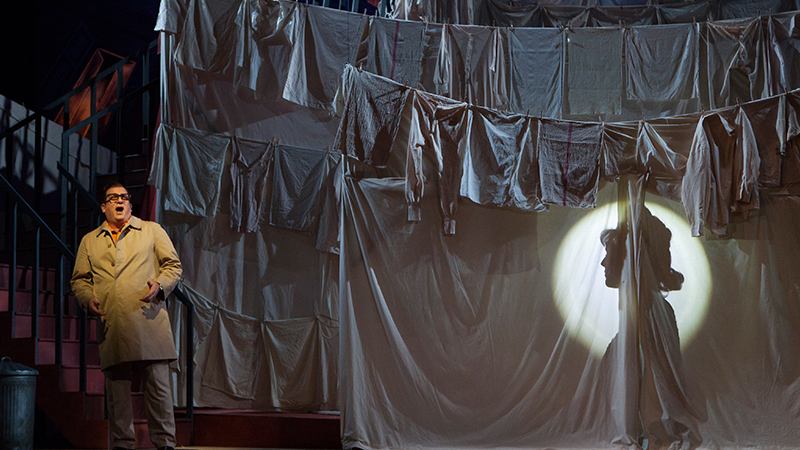-
10 Things to Know about DON PASQUALE
By COC StaffPosted in 23/24 Season
Donizetti’s dazzling comedy Don Pasquale makes its first appearance at the COC in 30 years this season, in a company debut for French-Canadian creative team Renaud Doucet and André Barbe! Set in 1960s Rome, this production promises eye-popping artistic design to complement the musical fireworks of Donizetti’s score.
Read on for 10 Things To Know about Don Pasquale and its composer, before joining us at the opera house!
BUY TICKETS
A composer of the peopleDonizetti was a prolific composer whose operas were mostly put together very quickly and with an eye to popular success. Like his contemporary Rossini, he had strong theatrical instincts; Don Pasquale has stood comparison with The Barber of Seville largely for this reason. Meanwhile, like Verdi after him, Donizetti’s operas were strongly informed by the tastes of the Italian public and aimed to reflect and reveal the lives of the common people.Opera buffa at its best
Don Pasquale was Donizetti’s 64th opera, composed in 1842 toward the end of his career when he had just been appointed music director and composer for the imperial court of Emperor Ferdinand I of Austria. It is today regarded as one of his best, representing the high point (and conclusion) of the 19th-century tradition of opera buffa, or comic opera.A clamorous success
The opera premiered on January 3, 1843 at the Théȃtre-Italien in Paris to great acclaim; one critic wrote, “no opera composed expressly for the Théâtre-Italien has had a more clamorous success. Four or five numbers repeated, callings-out of the singers, callings-out of the Maestro—in sum, one of those ovations…which in Paris are reserved for the truly great.”
His final triumph
Don Pasquale would be the last great success that Donizetti would remember: soon after it took Europe by storm, he was diagnosed with cerebro-spinal degeneration from a syphilitic infection, and by 1847 he was paralysed and largely unable to speak. He died in 1848, just five years after the glowing premiere at Théȃtre-Italien in Paris.

In briefThe story of a stubborn old man cured of his desire to wed a much younger woman, Don Pasquale opens with an ageing Pasquale refusing to let his nephew Ernesto marry. Instead, deciding to find a bride for himself, Pasquale chooses Norina—unaware that she is in fact Ernesto’s secret lover. A generational battle of wits and wills ensues, to hilarious consequences…
Recognize anyone?The opera makes reference to the colourful stock characters of the commedia dell’arte, a theatrical form popular in Europe from the 16th to 18th centuries (COC audiences might remember this style from our 2020 production of The Barber of Seville). Pasquale evokes the cunning Pantalone, Ernesto the lovelorn Pierrot, Malatesta the servant Scapino, and Norina the saucy Columbina, who is also Pierrot’s wife. Such types as the elderly buffoon, the lovestruck admirer, and the clever mistress were common in many comic operas of this period.
It’s not easy
Donizetti’s original cast featured some of the most famous singers of the day, whose vocal and dramatic abilities were familiar to him and whose talents were matched to the formidable challenge of the material. True to the bel canto style of emphasizing vocal beauty and flair, the music of Don Pasquale was composed in part to show off the virtuosity of its performers, with dazzling flourishes and dizzying speeds designed to awe and delight—as they continue to do today.Musical highlights: Norina
Norina’s Act I aria “Quel guardo il cavaliere” (“That glance, it pierced the knight’s heart”) is a soulful cantilena, or gently lyrical song, intended to be sung by a virtuoso coloratura soprano. As it opens, Norina is reading a passage from a romantic novel; by the end, we are left in no doubt that she knows everything there is to know about getting a man to do as she pleases.
Musical highlights: Poor Ernesto!
In his Act II aria “Cerchero lontana terra” (“I shall seek a distant land”), Ernesto laments his decision to leave Rome, having been driven out by his uncle—never to see his love again. “I shall seek a distant land, where I can sigh unknown,” he sings. He departs the stage just before Pasquale arrives to be introduced by Dr. Malatesta to his “sister”, Sofonia—in fact, none other than Norina herself.
Musical highlights: a devilish duet
Appearing in Act III of Don Pasquale, “Cheti cheti immantinente” (“Quietly, quietly, right away”) features a conspiratorial discussion between Don Pasquale and the doctor Malatesta that tests new limits for speed and vocal agility. This duet is famous for its sillabato, or rapid speech-singing (an early version of a patter song). Intricate, precise, and perfectly timed, it is one of the opera’s undoubted highlights!
Don Pasquale opens April 26 at the Four Seasons Centre for the Performing Arts!
BUY TICKETS
Photos: KK Dundas
